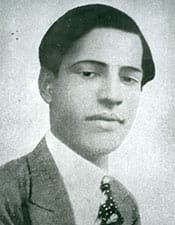[breadcrumb]
Kripalu’s Early Years
At only seven years old, Kripalu (whose given name was Saraswatichandra but was called Narayan) lost his father. The year was 1920 and the already impoverished family of nine children was thrown into financial turmoil.

Kripalu was born January 13, 1913 in Gujarat state.
Years later, he could still sadly recall seeing all their possessions piled in the street when their home was taken from them. Despite being a brilliant student and avid reader, he was forced to leave formal schooling in the seventh grade to help support his mother and sisters. Over the years he held a variety of low-paying jobs, but his talents always led him to work as a dramatist, poet and composer. His plays and musical compositions were of such high caliber, he decided to move to the bustling city of Bombay at 18 to seek his fortune.

Bapuji at 19
Things did not go well in the big city and by his 19th birthday, Kripalu was out of money and in the depths of despair. His depression was so deep he felt the only resolution was to end his life. Wandering the streets for an entire day, he eventually found himself at the door of the temple that was dearest to his heart. The evening arti had already begun at the Divine Mother Shrine as he knelt before the statue, tears streaming down his cheeks. Peering at this divine being, his vision shifted to a nearby bridge close to the beach. In his mind’s eye, he saw an electric train approaching the station just as his body fell from the bridge onto the tracks below. As he envisioned his body crushed by the train, he convulsed into sobs and entreated, “Oh Mother, I don’t want to live such a futile and loveless life. Let me kill myself.” It was not the first time he had contemplated suicide in the past discouraging year. In fact, he had considered it three times before.
Although the arti prayers were over, Kripalu remained sobbing on his knees, unaware that a Mahatma had silently entered the temple, offered a prayer and moved toward the desperate young man and placed his hand lightly on his head. Overcome with the man’s kindness, Kripalu fell weeping into the stranger’s arms. Caressing his head, the stranger softly implored Kripalu with the most comforting words he had ever heard: “My son, do not cry. Come along. Follow me.”
Without hesitation, Kripalu rose and left behind this kind stranger. The two walked silently down a darkened street until they found a bench outside a shop and sat down. Without recrimination or shame, the saint looked directly at Kripalu and said: “You have been thinking of killing yourself. Do not think of this. Suicide is a forbidden act.”
Kripalu was stunned. Never had he uttered a word about his thoughts of suicide to anyone. Caught off guard, he stammered and denied any such thing. The saint’s eyes conveyed he was fully aware of Kripalu’s intentions and denial was useless. Further, a slight smile curled his lips as he said: “Tonight you planned to jump from the Sandhurst Bridge and onto the track as an electric train passed underneath. But you are sadhak, a seeker of truth and holiness.”
Thoroughly exposed by such details of his vision and stunned at the saint’s words, Kripalu immediately confessed his lie and asked for forgiveness, bowing at the saint’s feet. Remarkably just a few minutes in this man’s presence had completely altered his intentions. A renewed faith showered upon him like an intangible mantle of peace.
Placing his hand gently on Kripalu’s shoulder, the Mahatma forgave him and added an intriguing invitation: “Tomorrow is Thursday. Come to see me between three and six in the afternoon.” Handing him the address of his ashram, he silently slipped away into the night. Sitting alone, Kripalu stared into the darkness, then at the address and wondered at this amazing turn of events. Suicide was now the furthest thing from his mind. He could hardly wait for the next day to dawn.
